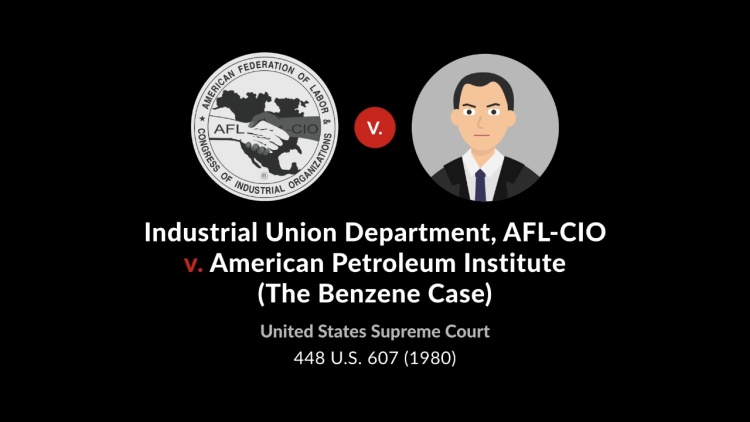Industrial Union Department, AFL-CIO v. American Petroleum Institute (The Benzene Case)
United States Supreme Court
448 U.S. 607, 100 S. Ct. 2844, 65 L. Ed. 2d 1010 (1980)

- Written by Eric Cervone, LLM
Facts
The Occupational Safety and Health Act of 1970 (act) delegated authority to the secretary of labor (secretary) to promulgate standards to ensure safe and healthful working conditions. According to § 3(8) of the act, standards created by the secretary must be “reasonably necessary or appropriate to provide safe or healthful employment and places of employment.” Section 6(b)(5) set the principle for creating the safety regulations, directing the secretary to “set the standard which most adequately assures, to the extent feasible, on the basis of the best available evidence, that no employee will suffer material impairment of health or functional capacity. . . .” Pursuant to the act, the secretary promulgated a standard to regulate exposure to benzene, a carcinogen. The secretary took the position that no safe exposure level could be determined and that § 6(b)(5) required him to set an exposure limit at the lowest technologically feasible level that would not impair the viability of the industries regulated. The American Petroleum Institute (plaintiff) took the issue to court, and the United States Court of Appeals for the Fifth Circuit held the regulation invalid. The Supreme Court granted certiorari.
Rule of Law
Issue
Holding and Reasoning (Stevens, J.)
Concurrence (Rehnquist, J.)
Concurrence (Powell, J.)
Concurrence (Burger, C.J.)
Dissent (Marshall, J.)
What to do next…
Here's why 900,000 law students have relied on our case briefs:
- Written by law professors and practitioners, not other law students. 47,000 briefs, keyed to 994 casebooks. Top-notch customer support.
- The right amount of information, includes the facts, issues, rule of law, holding and reasoning, and any concurrences and dissents.
- Access in your classes, works on your mobile and tablet. Massive library of related video lessons and high quality multiple-choice questions.
- Easy to use, uniform format for every case brief. Written in plain English, not in legalese. Our briefs summarize and simplify; they don’t just repeat the court’s language.






